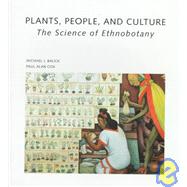Plants, People and Culture : The Science of Ethnobotany, a Scientific American Library Book
, by Balick, Michael J.; Cox, Paul Alan- ISBN: 9780716750611 | 0716750619
- Cover: Hardcover
- Copyright: 1/1/1996
The relationship between plants and people is profound, affecting nearly every aspect of our lives. In this compelling new book, two of the world's leading ethnobotanists argue that the very roots of human culture are deeply intertwined with plants. Beginning with the prehistoric use of plants by hunter-gatherers and the development of agriculture, the authors argue that plants have deeply influenced the trajectory of civilization. One out of four prescription drugs, for example, was discovered from studies of plants used by indigenous peoples for healing, and today ethnobotanical searches for new remedies for AIDS, inflammation, and cancer are proceeding at a rapid pace. Complicating such searches, however, are rapid changes in the lifestyles and diets of indigenous peoples, which are linked to increasing levels of diabetes and arteriosclerosis. Yet, even here, understanding of indigenous diets can possibly lead to new strategies for treating disease.
The inventive use of plants by indigenous shipwrights and weavers provides further evidence of the botanical sophistication of indigenous peoples, as does the shaman's use of plants to provide doorways into the other world - a world populated by both angelic and demonic beings. Although claims for such plants have sometimes been attributed to superstition, studies of these plants have revealed a plethora of novel compounds with potent neuropsychological impacts. Such compounds hold the promise of providing new treatments for psychiatric illness, but also the threat of societal disruption if their illegal traffic continues to grow.
The view that plants themselves can be sacred leads to a startling reconsideration of the role of indigenous people in conservation. The authors, who have both spent decades in the tropics, persuasively argue that rain forest conservation can best be accomplished by learning from, rather than opposing, indigenous peoples and their concerns.
The inventive use of plants by indigenous shipwrights and weavers provides further evidence of the botanical sophistication of indigenous peoples, as does the shaman's use of plants to provide doorways into the other world - a world populated by both angelic and demonic beings. Although claims for such plants have sometimes been attributed to superstition, studies of these plants have revealed a plethora of novel compounds with potent neuropsychological impacts. Such compounds hold the promise of providing new treatments for psychiatric illness, but also the threat of societal disruption if their illegal traffic continues to grow.
The view that plants themselves can be sacred leads to a startling reconsideration of the role of indigenous people in conservation. The authors, who have both spent decades in the tropics, persuasively argue that rain forest conservation can best be accomplished by learning from, rather than opposing, indigenous peoples and their concerns.







